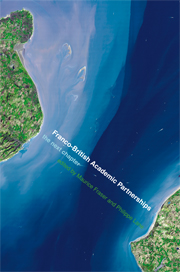Book contents
- Frontmatter
- Contents
- Notes on Contributors
- Foreword by His Excellency Bernard Emié
- Foreword by Sir Peter Westmacott
- Preface
- Part I Teaching and Training Partnerships
- Part II Research Partnerships
- 12 Franco-British Academic Partnership: Perspective from Imperial College London
- 13 Sorbonne University's Franco-British Partnerships
- 14 The École Pratique des Hautes Études (EPHE), Paris: Research Collaboration Between Britain and France
- 15 International University Partnerships and the Role of the French Connection: The Experience of a London College
- 16 Maison Française d'Oxford: A Hub of Academic Cooperation for the Humanities and Social Sciences in Oxford
- 17 Multicultural London English/Multicultural Paris French
- 18 Franco-British Cooperation in the Social Sciences During a Period of Structural Reform: Current Positions and Prospects
- 19 The Publishing Industry and Research Perspectives
- Part III Broader Perspectives
- Appendices: Addresses and Speeches at the Franco-British Academic Partnerships Seminar, French Institute, London, 5 February 2010
- Index
13 - Sorbonne University's Franco-British Partnerships
from Part II - Research Partnerships
- Frontmatter
- Contents
- Notes on Contributors
- Foreword by His Excellency Bernard Emié
- Foreword by Sir Peter Westmacott
- Preface
- Part I Teaching and Training Partnerships
- Part II Research Partnerships
- 12 Franco-British Academic Partnership: Perspective from Imperial College London
- 13 Sorbonne University's Franco-British Partnerships
- 14 The École Pratique des Hautes Études (EPHE), Paris: Research Collaboration Between Britain and France
- 15 International University Partnerships and the Role of the French Connection: The Experience of a London College
- 16 Maison Française d'Oxford: A Hub of Academic Cooperation for the Humanities and Social Sciences in Oxford
- 17 Multicultural London English/Multicultural Paris French
- 18 Franco-British Cooperation in the Social Sciences During a Period of Structural Reform: Current Positions and Prospects
- 19 The Publishing Industry and Research Perspectives
- Part III Broader Perspectives
- Appendices: Addresses and Speeches at the Franco-British Academic Partnerships Seminar, French Institute, London, 5 February 2010
- Index
Summary
On 26 June 2010, Valérie Pécresse, Minister for Higher Education and Research, signed the decree for the creation of Sorbonne University, as a confederal organisation linking Panthéon-Assas (Paris 2), Paris Sorbonne (Paris 4), Pierre et Marie Curie (Paris 6), l'INSEAD and the National Museum for Natural History (Muséum National d'Histoire Naturelle; MNHN). Some 60,000 students were enrolled in first degree courses in 2009/10, and among them were 14,000 students from abroad (35 per cent were on master's degree courses and 19 per cent on doctorate degree courses). In addition, more than 10,000 adults in lifelong learning programmes and 5000 students from preparatory classes at the Grandes Écoles were enrolled. More than 500 students are registered in competitive training programmes such as double major bachelor's degrees (Science and Social Sciences, Science and Philosophy, Sciences and History, Science and Musicology, Science and Political Sciences, Law and History, Law and History of Arts), and bilingual programmes in Literature and Humanities, and 300 students are studying in programmes intended for ‘top athletes’. A third of the foreign students come from Europe, 20 per cent are from the Maghreb, 12 per cent from Asia, 12 per cent from Africa, 12 per cent from the American continent (a third of these from North America) and 10 per cent from the Middle East.
The major disciplinary fields are represented at Sorbonne University (see Figure 1), in training programmes as well as in research programmes, at the best international level.
- Type
- Chapter
- Information
- Franco-British Academic PartnershipsThe Next Chapter, pp. 107 - 109Publisher: Liverpool University PressPrint publication year: 2011



